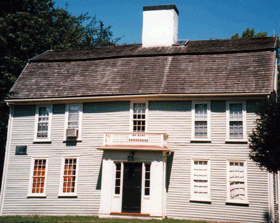Wealth and Salem Village
Conflict
In Salem Village, controversy surrounding Samuel Parris erupted before the outbreak of witchcraft in his household. Parris found his staunchest supporters among members of his church, though many householders and their wives also supported him. Salem Villagers householders who were not church members constituted the foundation of the opposition to his ministry. Some villagers did not take a public stand for or against the minister. By 1691, and likely earlier, this discord was expressed politically in the election of pro- and anti-Parris committeemen.
Some historians have suggested that behind Salem Village's factionalism lay powerful economic differences. In their classic study of Salem witchcraft, Salem Possessed, Paul Boyer and Stephen Nissenbaum, locate the origins of the village's divisions that culminated in the witchcraft outbreak in the broad historical shift of New England's economy towards commerce and capitalism. In their account, the poorer, more traditional, religiously-oriented, agricultural population of Salem Village lashed out against the wealthier, cosmopolitan, and economically advancing society of Salem Town and its sympathizers in Salem Village, who tended to live near the town. Primarily relying on the village's 1695 tax list, Boyer and Nissenbaum linked the names on the pro- and anti-Parris petitions of that year to the taxes they were assessed. They concluded that pro-Parris villagers were not only more connected to the village church but were substantially less wealthy than the anti-Parris faction. Wealth distinctions between the two factions were most glaring at both the upper and lower ranges of the economic ladder: the village's highest taxpayers overwhelmingly opposed Parris while its poorest taxpayers disproportionately supported him.
Was Salem Village's discord over its minister and the witch hunt of 1692, expressed in the pro- and anti-Parris petitions, grounded in the economic disparities of its population?
To investigate the relationship of economic distinctions to Salem Village factionalism and witchcraft, download the 1690 Tax Data Set and click Next.
